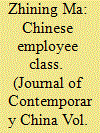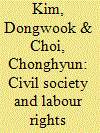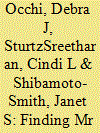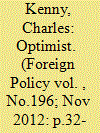| Srl | Item |
| 1 |
ID:
100351


|
|
|
|
|
| Publication |
2010.
|
| Summary/Abstract |
As the 'World's Factory', China now has the biggest worker/employee class in the world. Though this newly emerging social group has captured much attention, relatively few scholars have paid attention to such sociological questions as raised by this paper: rather than referring to such a huge group of almost 500 million people simply as 'Chinese workers' or 'Chinese employees', can this social class be stratified and in what way? What is the current situation of the employee class in China's contemporary industrial relations? This paper attempts to concisely answer the above questions by proposing a three dichotomy segmentation approach and a review of the existing literature on the matter, providing a broader picture to the readers with regards to the current situations of different employee groups in the context of China's unprecedented transitional economy.
|
|
|
|
|
|
|
|
|
|
|
|
|
|
|
|
| 2 |
ID:
170997


|
|
|
|
|
| Summary/Abstract |
Why do some national governments in Asia and the Pacific protect labour rights better in practice than others? This article argues that labour rights are better protected in Asia-Pacific countries where civil society organizations participate more intensively in the government's policy-making process. It goes beyond treating regime type in the aggregate and demonstrates that the associational dimension of regime type plays a critical role in shaping government protection of labour rights in Asia and the Pacific. Multivariate longitudinal analyses of all 30 Asia-Pacific countries from 1981 to 2011 find robust support for the theory, using new data on civil society participation, and controlling for electoral democracy, trade openness, economic development, unobserved country-level heterogeneity, and other factors.
|
|
|
|
|
|
|
|
|
|
|
|
|
|
|
|
| 3 |
ID:
100296


|
|
|
|
|
| Publication |
2010.
|
| Summary/Abstract |
Language standardization lies at the heart of Japanese modernity. And numerous aspects of language development intended to fit the modern Japanese state intersect to regiment the linguistic imaginary regarding women's speech. Focus on Yamanote Tokyo-based joseigo ('women's language'), Standard Japanese and certain urban Kansai dialects in popular text and televisual representations of romantic heroines in geographically and linguistically peripheral areas of Japan has been documented, but has left the issue of linguistic masculinity and the romantic hero unexplored. The relation of male speakers to hyo-jungo was assumed and 'masculine' speaking practices as broadcast in public space have received little attention despite a popular understanding that certain forms (e.g., ore 'I', and assertive sentence final particle zo) are 'masculine' in effect. Here, we examine images of manly men in contemporary romantic representations set in dialect-speaking areas to illustrate the linkages between the romantic hero and the use of Standard Japanese masculine forms and to offer insight into the underexplored set of possibilities for male speakers circulated in popular media.
|
|
|
|
|
|
|
|
|
|
|
|
|
|
|
|
| 4 |
ID:
118392


|
|
|